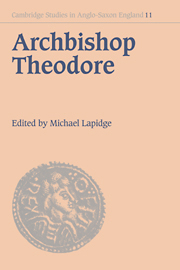Book contents
- Frontmatter
- Contents
- Preface
- List of abbreviations
- 1 The career of Archbishop Theodore
- 2 The Syriac background
- 3 Theodore of Tarsus and the Greek culture of his time
- 4 Rome in the seventh century
- 5 Theodore, the English church and the monothelete controversy
- 6 The importation of Mediterranean manuscripts into Theodore's England
- 7 Theodore and the Latin canon law
- 8 The Penitential of Theodore and the Iudicia Theodori
- 9 Theodore and the Passio S. Anastasii
- 10 Theodore and the Laterculus Malalianus
- 11 Theodore and the liturgy
- 12 Theodore's Bible: the Pentateuch
- 13 Theodore's Bible: the gospels
- 14 Theodore and Anglo-Latin octosyllabic verse
- 15 The Canterbury Bible glosses: facts and problems
- Index
12 - Theodore's Bible: the Pentateuch
Published online by Cambridge University Press: 03 May 2010
- Frontmatter
- Contents
- Preface
- List of abbreviations
- 1 The career of Archbishop Theodore
- 2 The Syriac background
- 3 Theodore of Tarsus and the Greek culture of his time
- 4 Rome in the seventh century
- 5 Theodore, the English church and the monothelete controversy
- 6 The importation of Mediterranean manuscripts into Theodore's England
- 7 Theodore and the Latin canon law
- 8 The Penitential of Theodore and the Iudicia Theodori
- 9 Theodore and the Passio S. Anastasii
- 10 Theodore and the Laterculus Malalianus
- 11 Theodore and the liturgy
- 12 Theodore's Bible: the Pentateuch
- 13 Theodore's Bible: the gospels
- 14 Theodore and Anglo-Latin octosyllabic verse
- 15 The Canterbury Bible glosses: facts and problems
- Index
Summary
The biblical commentaries preserved in Milan, Biblioteca Ambrosiana, M. 79 sup., are a treasury of information about Theodore's contribution to Anglo-Saxon learning in the late seventh century. For the historian of the Latin Bible, however, the lemmata which accompany the commentaries are a source of knowledge no less valuable. There are 465 distinct lemmata for the Pentateuch, a high proportion of them from Genesis or Exodus, including also sixteen from Jerome's preface to Genesis. Varying in length from a single word to whole sentences, and totalling nearly 1,500 words, they provide us with our earliest clear evidence of a Pentateuch text in use in Anglo-Saxon England, predating by a generation the Northumbrian ‘Codex Amiatinus’. More than this, they may add to our general knowledge of Vulgate textual history in the period between Jerome's death and the Carolingian Bible revisions of the eighth and ninth centuries, a period from which, apart from the Codex Amiatinus, only two other Bible manuscripts containing the Pentateuch survive. However fragmentary it may be, the evidence offered us by Theodore's lemmata thus demands the closest scrutiny.
Can such evidence, indirect as it is and surviving in an eleventh-century Italian copy, convey an accurate picture of the Pentateuch text in use at Canterbury in the 670s? There are compelling reasons for optimism. To begin with, the accuracy of a very large proportion of the text can be easily demonstrated. Textual differences between surviving Vulgate manuscripts at any period are comparatively few and a great proportion of their texts is universally shared.
- Type
- Chapter
- Information
- Archbishop TheodoreCommemorative Studies on his Life and Influence, pp. 236 - 254Publisher: Cambridge University PressPrint publication year: 1995
- 45
- Cited by



